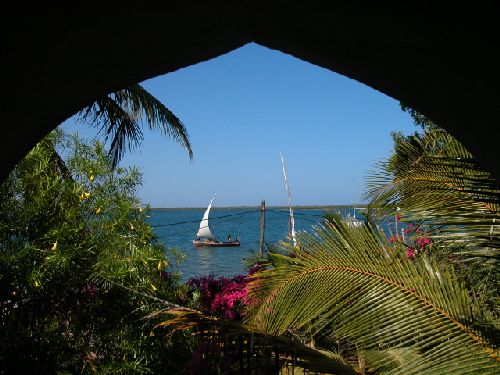
Kijani House is a small, very exclusive and charming hotel overlooking the entrance to the Shela Channel on the island of Lamu. In its large tropical garden and around the two fresh-water swimming pools you will find real peace and relaxation.
The veranda of your spacious en-suite room, furnished with coastal antiques, is the ideal place for planning exciting safaris to experience the fascination of Swahili culture. You can also work up an appetite walking from the gardens and along the 12 km Shela Beach, returning to an exotic selection of seafood, Swahili dishes and a touch of Italian cuisine in the Kijani Restaurant.
One of the few unspoiled spots is Lamu, and it is very likely that it will remain so for years to come as the only practical way to reach this enchanted isle is by aeroplane. In Lamu you find a vibrant society in harmony with its traditions: Lamu people are dubious of the merits of what we term ‘Progress’.
When a telephone line was established in Lamu some years back, one Arab told the proprietor, “Never mind, the elephants on the mainland will soon knock the poles down.” This does in fact periodically occur.
The streets of Lamu are narrow, cool and quiet. They are surprisingly intimate spaces enclosed by massive stone buildings whose thick coral rag walls give the town its distinct colour and texture. It is not a town of landmarks and monuments – the Fort alone stands out. Religious and domestic buildings are difficult to distinguish from one another. Both are simple with few openings and neither has any exterior decoration except for Lamu’s characteristic heavy carved doors.
Accommodation
Each room has a bathroom and has its own balcony or veranda facing the garden and the sea. The rooms are spread throughout the garden in three separate small traditional Swahili buildings – formerly private homes – with walls made of coral, boriti ceiling and makuti roofs.
Food – The kitchen offers all types of fish, lobsters, crabs and prawns fresh from the sea, along with meat and fresh vegetables, together with African and Italian specialities.
We bake our own bread, produce marmalade and yoghurt with the fresh product from our small farm on the island, which also provides eggs and honey.
Life in Lamu has a distinctly Arab flavour; the ladies scurry down back streets wearing buibuis (black cloaks which cover them entirely) and yet they are prone to shadowing their dark eyes with kohl and have been known to cast amorous glances from the folds of their buibuis towards favoured admirers. In the evenings the aroma of thick Turkish-like coffee permeates the atmosphere; old men sit together philosophising on the front steps of their houses, and little boys chase one another, darting in and out of the quaint shops that line the main street.
The restaurants of Lamu bustle with business. Bajun fishermen tell tales to one another while they enjoy heaped plates of rice. Night-time is delightful, and everyone takes advantage of the cool breezes that blow from the Indian Ocean. You may even see the aristocratic shariffs (blood descendants of the Prophet Mohammed) taking a stroll, dressed in long white robes called kanzus and carrying walking sticks. They are as distinguished as the black-suited and bowler-topped gentlemen of Fleet Street; but rather than having stocks and bonds on their minds, they are more likely to have some problem involving the interpretation of one of the Prophet’s sayings.
Activities
Lamu Museum – Any tour of Lamu is best begun at the Lamu Museum which provides an excellent introduction to the town and the region, both past and present. The exhibits include the material culture of the archipelago, ethnographic tableaux of neighbouring coastal peoples, as well as a collection of maritime artifacts and model dhows. After this orientation you are ready to amble through the streets, set sail for nearby ruins, or just go fishing.
Lamu Fort – The Fort is a cultural and community centre housing maritime and natural history exhibits, a public library, conservation studios, a museum shop, and a restaurant and caé specializing in Swahili cuisine.
Shela – Shela is a 45 minute walk south along the beach. Once around the point beyond the village and Kijani House, the dunes and the beach stretch for seven deserted miles. There are interesting ruins at the back of the village, though Shela’s most prominent landmark is its Friday Mosque built with a conical shaped minaret in 1829.
Takwa – The ruined town of Takwa lies across the channel and up a narrow mangrove creek on Manda Island. It can be approached only by boat and only on a rising tide. You can hear the ocean over the dunes in this lovely place as you wander among fabled baobab trees and the remains of a 16th century Swahili town. Visitors who do not wish to spend the night will have to take a quick (approx. 45 minutes) tour so as not to miss the outgoing tide. Be sure to see the Mosque with a pillar over its fine qibla, and also the pillar tomb. Takwa is a national monument administered by the National Museums of Kenya. A camping site is provided.
Matondoni – This village is about 2 hours from Lamu whether by foot or by mashua, a small sailing dhow. Sailing time depends on the monsoon and the tide. Matondoni is known for its shipwrights who build the traditional lateen rigged dhows, both the large jahazi and the smaller mashua.
Further afield – Destinations further north entail passage through the shallow Mkanda Channel and must be carefully timed with the tide. The north side of Manda Island together with Manda Toto, a favourite fishing and snorkelling spot, makes a nice day trip. Visits to Pate Island usually require staying overnight. There are no facilities and the mosquitos are vicious, so be prepared. The most important settlement on the island is Lamu historic rival, Pate Town. There are many ruins here but the most spectacular is the fort at Siyu in the middle of the island.




